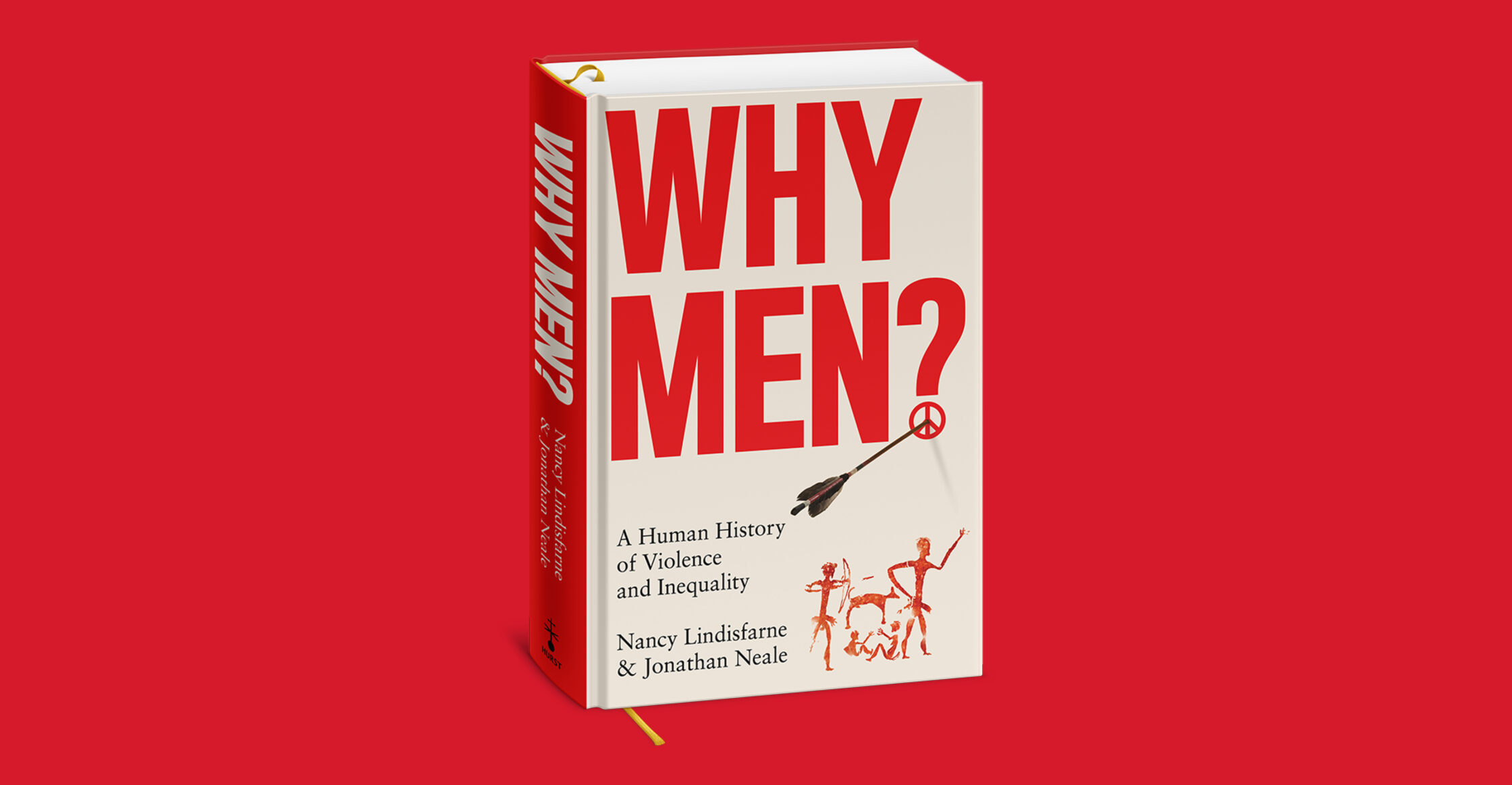This book is about how love endures. It is also about how our human capacity for kindness and empathy can imprison us in ruthless competition and violent hierarchies. Both ways of living with each other are rooted in our evolutionary past and this paradox is at the heart of our human nature. And this book is also about how, for centuries and today, a set of popular ideas and popular books by people from society’s dominant elite have obscured this paradox, leaving many of us convinced that war, violence, oppression and inequality are the only natural order of things—and male.
The work of these famous authors of ‘big boy’ human history—men like Steven Pinker, Jared Diamond and Yuval Noah Harari—is clever and confusing. They deplore violence, but say it is now better controlled and managed than in earlier times. Yet, unfortunately, they say, competition, aggression, violence and warfare are an inevitable part of human nature. This is the law of evolution, they say, because men must fight each other to possess women sexually.
This is fantasy posing as science, and we have written this book to challenge it. There is now a great deal of evidence from primatologists, archaeologists and anthropologists that we actually became equal as we became human. As human beings evolved, we developed a complex adaptation as ambush hunters of big game—deer, elk, antelope and much else. This was a challenging niche for puny creatures like ourselves, so how did we do it? By becoming cooperative, and living in groups organised by egalitarian principles, instead of the bullying and pecking orders characteristic of almost all our primate cousins.
In short, people shared meat, shared childcare, shared orgasms and resisted inequality. Preventing bullying fitted with hunting and gathering as a way of life and became part of who we are.
However, the tendency to create dominance hierarchies was also part of our primate inheritance. It did not disappear, but it was suppressed. Creating, and submitting to, hierarchy remained part of our human nature. Understanding this apparent contradiction— our simultaneous disposition both to equality and inequality—is basic to understanding ourselves as human beings.
We tell this human history as a drama in two parts. Our frame is ecological. Act One is the story how early humans built egalitarian societies in order to adapt and survive—societies not wholly unlike those of hunter-gatherers in recent times. Act Two is about the creation of class society, a decisive break with our long ancestral experience of sharing with equals. The invention of agriculture some 12,000 years ago was a revolution in slow motion. It brought with it new politics, new technologies and a new relationship to the wider world. Act Three has yet to be written. We can only guess at the adaptation that will come with climate change. But having a clear view of what has gone before has been another reason we have written this book.
We have long known about the agricultural revolution. But how this history—and ‘human nature’—is to be understood has changed greatly. What is new is the overwhelming scientific evidence that inequality is not an inevitable aspect of ‘human nature’. Rather, it has only ever been part of the story. Since the 1980s the science has been remarkable, and there has been an enormous flowering of research in the field of human evolution. There are now many amazing new studies of primate behaviour, new archaeology of early humans and new ethnographies of near contemporary hunter-gatherers. Thanks to chemical microanalyses, DNA sampling, radiocarbon dating and patient work of archaeologists in humble homes, we have learned a great deal about the people who lived in pre-class and then early class societies. What is now clear is that, for more than 200,000 years, human beings lived in egalitarian societies where men and women were also equal. This is a remarkable and precious insight that comes from the new science.
Seeing this history afresh, three things stand out. The first is that wherever class societies and socio-economic elites appeared, men and women became unequal too. So with class inequality came patriarchal domination, and cults of male violence. The consistency of this association is extraordinary, the persistent links between economic and gender inequality; between sexism and other isms, and the exercise of class power. The central question then becomes ‘Why men?’, and the answers are to be found between our primate heritage and the character of class society.
The second thing we can learn from our new understanding of this history is that human beings have not forgotten that they are adapted to favour equality. As a result, hierarchies and the violent domination they produce have been challenged and subverted again and again.
The third revelation of ‘human nature’ is a consequence of the second. Over these past 12,000 years, elites have constantly had to reconfigure class relations—starting with gender inequality—in an effort to suppress dissent and secure their privilege. This, not some inescapable fact of evolutionary biology, is the root of human violence—and the root of the present tyranny of conservative ideas about human evolution.
The Tyranny of Bad Science
Such ideas have been with us since the invention of class society, but the contemporary version stems from the publication of Sociobiology by the Harvard biologist E.O. Wilson in 1975. His ideas fitted with the zeitgeist and the beginnings of neoliberalism, and they caught fire. Sociobiology was soon an academic field in its own right, now usually known as evolutionary psychology.(1)
The gist of the ideas about gender in sociobiology and evolutionary psychology is that men and women are ‘naturally’ different and unequal. This claim is made with certainty and backed by the assumed authority of Charles Darwin. It is a claim which presents itself as utterly scientific and completely up to date. It is also a claim which is hard to gainsay. Indeed, many people nowadays find the statement that men and women are naturally different and biologically unequal both accurate and obvious. And they would agree with what it entails: that men are obsessed with dominance—and sex. So men compete to use as many women as possible to pass on their genes.
By contrast, the argument goes, women can only have a limited number of children, so women concentrate on ensuring the survival of their children. To do this, women became part of nuclear families where the man brings home the bacon for the woman to cook for the family. There is a further spin: women take care to mate with men of ‘superior genetic quality’. Incidentally, this logic would also suggest that the most powerful men in society are also genetically superior.
Given these strategies of reproduction, evolutionary psychologists consider men naturally violent and promiscuous, and women naturally caring and faithful. They argue that hunting was crucial to the human adaptation, and that the division between men who hunt big game and women who gather and cook is the source of gender inequality.
You know this argument. The familiarity of the paradigm is the measure of its power. Here we take on these conservative arguments about human nature.
Other people also find this argument ugly and unpalatable. Among them are many feminists and leftists who argue that no one should be trapped in a predetermined destiny as a member of a group or class with a ‘natural’ place in a pecking order. Rather, they believe, human beings should enjoy freedom and equal opportunities and equal outcomes. But there is a habit among feminists and leftists of taking these ideas a step too far, and insisting not only that there is no such thing as women’s nature, or working-class nature, or Black nature, but more broadly that there is no such thing as human nature. But of course there is, and everyone knows it. Anyone who has lived closely with horses or dogs knows there are such things as horse nature or dog nature. We too are animals. There is such a thing as human nature. Part One of this book will be about what that nature is, and how it is rooted in our evolution.
Right from the get-go many people saw sociobiology as a sexist, classist palaeo-fantasy. The primatologist Sarah Blaffer Hrdy was at Harvard in the 1970s:
The years between 1971 and 1975 were heady times for those of us then graduate students in the life sciences at Harvard. The discipline of sociobiology was born [there]. Yet it would be misleading to remember only the intellectual excitement of those years. Within the Harvard of that time there was no overlap at all between feminism and evolutionary biology, not even a common language. Feminists were outraged at what they took the sociobiologists to be saying, and the sociobiologists were mystified to discover that feminists were demonstrating at their lectures. As a woman in the midst of all this, I felt quite alone.(2)
Hrdy kept her nerve and became our leading feminist primatologist. However, the ideas of sociobiology, and then evolutionary psychology, held sway for the next thirty years. But Hrdy was not alone. The Dutch and American primatologist Frans de Waal says he felt like a toilet frog among biologists for the last three decades of the twentieth century. The toilet frog, a real Australian amphibian, sits in the toilet and holds onto the sides like grim death with its ‘suction cup toes’, no matter what. For all that time, de Waal says now, sociobiology kept falling on his head:
The argument typically ran as follows: (1) natural selection is a selfish, nasty process, (2) this automatically produces selfish and nasty individuals, and (3) only romantics with flowers in their hair would think otherwise. Here is a characteristic statement [by the biologist Michael Ghiselin], cited over and over again in the literature:
‘No hint of genuine charity ameliorates our vision of society, once sentimentalism has been laid aside. What passes for cooperation turns out to be a mixture of opportunism and exploitation … Given a full chance to act in his own best interest, nothing but expediency will restrain [a person] from brutalizing, from maiming, from murdering—his brother, his mate, his parent or his child. Scratch an “altruist” and watch a “hypocrite” bleed.’(3)
But then, says de Waal, after years of such viciousness, around about 2000, ‘a curious thing happened: the theory vaporized’. By 2010 the field had turned 180 degrees, and everyone was agreed that humans were ‘supercooperators’:
How radically attitudes have changed is clear every time I show audiences the notorious Ghiselin statement that had landed me in the toilet to begin with: ‘Scratch an altruist and watch a hypocrite bleed.’ Although I have featured this cynical line for decades in my lectures, it is only since about 2005 that audiences greet it with audible gasps and guffaws at something so outrageous, so out of touch with how they see themselves, that they can’t believe it was ever taken seriously. Had the author never had a friend? A loving wife? Or a dog, for that matter?(4)
What propelled the general change is clear. The wider political environment had altered. The anti-globalisation movement had arrived, and George Bush had gone to war. A new generation of college students were increasingly repelled by the masculine styles and catastrophic policies of the old elite.
From the turn of the twenty-first century the approach of primatologists to human evolution changed a great deal. But there were still problems. Sociobiology was becoming evolutionary psychology, and increasingly located in psychology departments. The primatologists were changing. But many evolutionary psychologists paid no attention, and even today still subscribe to the ideas of manhood red in tooth and claw. And it is the evolutionary psychologists, not primatologists, who continue to dominate the media and popular understanding. The origin myth of the alpha male remains useful and exciting to many who subscribe to neoliberal values, or who simply believe that our societies are meritocracies, where everyone has an equal chance, but not equal ability nor the same desire to succeed.
There is another problem. The standard response of outraged feminists has been to insist that gender inequality is ‘socially constructed’. But this response simply cannot answer the question: why is gendered inequality constructed differently at different times?
What’s worse, having arrived at this impasse, the social construction school have no alternative understanding of evolution and human gender. This leaves them vulnerable. Their arguments can look like little more than assertion, because they have no counter to right-wing ideologies of evolutionary psychology.
There can also be problems when feminists doubt themselves in their private lives. In times of personal distress, it is all too easy to fall back on the gender stereotypes we know so well. In the long dark teatime of the soul, all women may seem naturally caring, and all men bastards. The slippage occurs easily because the social construction school have a critique of evolutionary psychology, but no other scientific understanding to build on.
Here we want to make a scientific argument about difference and inequality in human evolution. The basic problem with evolutionary psychology is not that it is right-wing science, but that it is bad science. There are three steps to explain why the method is unscientific.
The first step is to give full credit to the studies of animal behaviour used by evolutionary psychologists. These are good science. When sociobiologists write about fire ants or olive baboons, they pay careful attention to the sources in the literature. They do the reading.
The second step is when evolutionary psychologists compare animal societies to human societies. Then they start to write bad science, in part because they do not do the reading in social sciences. Worse, they assert things which are astonishingly ethnocentric but which they take as ‘common sense’. The giveaway is the missing footnote. They do not cite sources for their assertions about humanity. This neglect is probably one reason that sociobiology has moved from sociology departments to psychology departments. Sociologists would not tolerate scholars who did not read sociology.
The third step, equally as unscientific, is that evolutionary psychologists compare primates and other animals to humans of their own class and culture. They also often compare primate behaviour to psychology experiments done on American college students at elite universities. These studies are then used to prove that humanity is cruel and selfish, rather than that students at Yale and Stanford are cruel and selfish.
They do not give explicit reasons for choosing these comparisons. But the implicit assumption is that men and women of their class and nationality are the benchmark for defining human normalcy. This ethnocentrism also seems to excuse them from having to do the reading.
These are basic problems of method in all sociobiology. It is not just reactionaries who do not do the reading and assume that Americans can be used as the standard against which to judge others. The very best of the feminist, liberal and socialist biologists, including ones we rely on heavily in writing this book, do the same thing. These have become ingrained mistakes in the discipline.
So, what should we think about human nature instead? What should we be basing that understanding on? In this book, the answer is twofold: first we need to look at the evidence—the real evidence—about early humans’ relationship to equality; then, we need to consider human history, and how it has taken us down a different, violent path.
Footnotes
(1) E.O. Wilson 1975.
(2) Hrdy 1981, viii–ix.
(3) de Waal 2013, 39.
(4) Ibid., 43.

Nancy Lindisfarne is an anthropologist who previously studied and taught at SOAS University of London. Her most recent book, written with Richard Tapper, is Afghan Village Voices.

Jonathan Neale is an historian and professional writer. His most recent book is Fight the Fire: Green New Deals and Global Climate Jobs.
